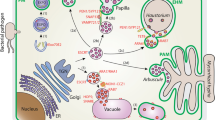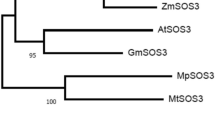Abstract.
Taking the binding of fusicoccin to plasma membranes as an indicator of complex formation between the 14-3-3 dimer and H+-ATPase, we assessed the effect of osmotic stress on the interaction of these proteins in suspension-cultured cells of sugar beet (Beta vulgaris L.). An increase in osmolarity of the cell incubation medium, accompanied by a decrease in turgor, was found to activate the H+ efflux 5-fold. The same increment was observed in the number of high-affinity fusicoccin-binding sites in isolated plasma membranes; the 14-3-3 content in the membranes increased 2- to 3-fold, while the H+-ATPase activity changed only slightly. The data obtained indicate that osmotic regulation of H+-ATPase in the plant plasma membrane is achieved via modulation of the coupling between H+ transport and ATP hydrolysis, and that such regulation involves 14-3-3 proteins.
Similar content being viewed by others
Author information
Authors and Affiliations
Additional information
Received: 10 February 2000 / Accepted: 31 March 2000
Rights and permissions
About this article
Cite this article
Babakov, A., Chelysheva, V., Klychnikov, O. et al. Involvement of 14-3-3 proteins in the osmotic regulation of H+-ATPase in plant plasma membranes. Planta 211, 446–448 (2000). https://doi.org/10.1007/s004250000347
Issue Date:
DOI: https://doi.org/10.1007/s004250000347




